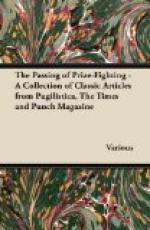Concerning the latter, the latest reports are not reassuring. Like his celebrated prototype of fable, the ill-fated “Don’t Care,” he runneth a chance of being “devoured by lions”! At least he appears to have sought the company of those parlous beasts in their native Afric wilds. We hear that “the lions kept him tucked up one night,” which same news (—gathered from a diurnal intituled the Johannesberg Star—) hath a fearsome and ill-boding sound. That he is—for the time at least—in every sense “tucked up,” is only too obviously true. Peradventure he may yet think the better of it, correct his Frothy Distemper and Vagrant Disposition, and (as the agonising advertisements have it) return to his friends that all may be forgiven and much forgotten!
But the last accounts of him picture him as lying languidly asprawl upon a Mausoleum in Mashonaland, playing dice with himself! The tomb would indeed appear to be, in the sombre words of the Mystick Poet:—
“The vault of his lost Ulalume,”
the runic-sounding word, “Ulalume,” being taken perchance as the African synonym for “Reputation.” Whether the cheering word Resurgam will ever be appropriate to that Tomb remaineth to be seen. But it would appear only too plain that GRANDOLPH (in the words of the aforesaid SHAFTESBURY) “hath been a great frequenter of the woods and river-banks, where he hath consum’d abundance of his breath, suffer’d his Fancy to evaporate, and reduc’d the vehemence both of his Spirit and Voice.” In short, that the erst ambitious and aspiring GRANDOLPH is still content, for the time at least, to play the part of The Idle Apprentice.
* * * * *
[Illustration: THE IDLE AND THE INDUSTRIOUS APPRENTICE.
(A long way after Hogarth.)]
* * * * *
“WHYS”—WISE AND OTHERWISE.
(BEING QUEER QUERIES.)
[Illustration]
I wonder why, whene’er a four-
Wheeler advances to a door,
(A common thing on Britain’s shore,)
I wonder why,
At once some aged man will stand
And stare until its inmates land,
As if enchained by something grand,
Or weird, or high.
I wonder why the powers that mend
The streets should root them up, and rend
The roads with giant pipes on end
And bricks awry,
Just when we turn to town again;
Though nothing stirred while West Cockayne
Lay waste—a huge, deserted
lane—
I wonder why.
I wonder why athwart the Row
Stray loafers linger, loth to go
Past the mid-crossing, and are so
Resolved to die,
Hoping that, as you gallop near
You’ll maul them by your mad career—
I wonder why.
I wonder why, when theatre Stalls,
Are “papered” by Professionals,
And children arch in Thespis’ halls
Their gambols ply,
Why the Box-office has the face
To offer me, who book place—
A Stall that would the Pit disgrace,
I wonder why.




